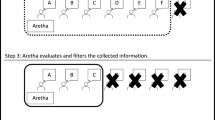Abstract
David Henderson and Terry Horgan argue that doxastic epistemic justification requires the transglobal reliability of the belief-forming process. Transglobal reliability is reliability across a wide range of experientially possible global environments. Focusing on perception, I argue that justification does not require transglobal reliability, for perception is non-accidentally reliable and confers justification but not always transglobally reliable. Transglobal reliability is an epistemically desirable property of belief-forming processes, but not necessary for justification.
Similar content being viewed by others
Notes
Parenthetical references are to Henderson et al. (2011). H&H, like epistemologists generally, use ‘epistemic justification’ for the positive epistemic that is a constituent of knowledge, but may fall short of truth. I shall follow their usage. However, I prefer ‘warrant’, and ‘justification’ for a narrower status that connects to an agent’s ability to reason critically. See my 2011 and 2012.
In my ‘Recent Work on Reliabilism’ I also argue transglobal reliability is not sufficient for justification.
Global environments are “clusters” of possible worlds, for you can take a number of different possible paths through a global environment, but everything is fixed in possible worlds. Your global environment is then the cluster of fixed possible worlds with all of the paths you might really take.
H&H say we can’t make sense of this idea quantitatively, for since there are infinitely many possible environments, nothing counts as quantitatively “most” possible environments. And they say we cannot think of “most” in terms of a greater volume of possible environments, for there is no metric for determining volumes of possible environments.
Fortuna’s process, it should be noted, is not merely statistically reliable, in the way a run of heads on a fair coin would be statistically reliable. Her process is counterfactual supporting in her local environment, so that in nearby worlds where she forms barn beliefs on the basis of color, her beliefs are true.
H&H tend to describe local reliability without global reliability in prejudicial terms, as if such reliability by definition must be “accidental” or “lucky” reliability. They consistently describe local without global reliability as reliability in an environment the agent “happens” to occupy, connoting just so happens by “happens” (p. 70). They then quickly conclude that the reliability of such processes is just a matter of luck, an accident. “Belief-fixing processes that are merely locally reliable are unacceptably risky” (p. 76, my emphasis). But then it seems to me they are conflating local reliability without global reliability with accidentally reliable processes.
References
Graham, P. J. (2011). Psychological capacity and positive epistemic status. In J. G. Hernandez (Ed.), The new intuitionism. London: Continuum Press.
Graham, P. J. (2012). Epistemic entitlement. Nous, 46, 449–482.
Henderson, D., & Horgan, T. (2011). The epistemological spectrum. Oxford: Oxford University Press.
Acknowledgments
The present paper began as a commentary at the 2012 Pacific Division APA on H&H’s book. I am grateful to H&H for discussion then and for discussions on many other occasions. I am also grateful for helpful comments from my colleagues Zachary Bachman, Coleen Macnamara, and Eric Schwitzgebel on the penultimate draft.
Author information
Authors and Affiliations
Corresponding author
Rights and permissions
About this article
Cite this article
Graham, P.J. Against transglobal reliabilism. Philos Stud 169, 525–535 (2014). https://doi.org/10.1007/s11098-013-0241-4
Published:
Issue Date:
DOI: https://doi.org/10.1007/s11098-013-0241-4



